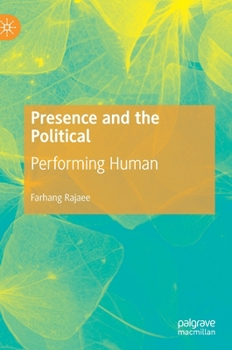Presence and the Political: Performing Human
Select Format
Select Condition 
Book Overview
This book deals with a concern of how humanity performs toward itself and how it performs within the public realm, and where it must be in relation with others. Public life is not solely about politics but also the political, i.e., intellectual, moral, economic, religious, and collective habits--including fashions and amusements, artefacts, histories, and legacies. This book argues that man raison d' tre in worldly life is to have a civil presence and create civilization. It contends that what makes it possible is the coming together of "presence, ethos, and theatre" and their working in concert. The first half of this book elaborates on the nuances of these three pillars, and the second half offers three examples of civilizations that have succeeded to achieve this within what it claims to be three major worldviews that he calls "divine-immanence, the divine-transcendence, and human-immanence."
Related Subjects
Philosophy Political Science Politics & Social Sciences Social Science Social Sciences




